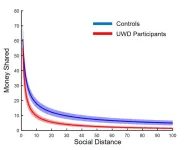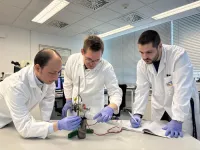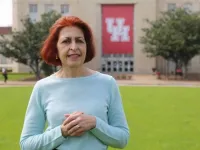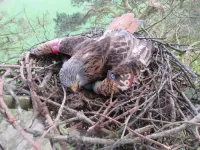(Press-News.org) Are there areas of the brain, which regulate prosocial, altruistic behaviour? Together with colleagues from the universities in Lausanne, Utrecht and Cape Town, researchers from Heinrich Heine University Düsseldorf (HHU) have studied a very special group of patients and established that the “basolateral amygdala” (part of the limbic system) plays an important role in this. In the scientific journal Proceedings of the National Academy of Sciences (PNAS), they describe that this region calibrates social behaviour.
Prosocial behaviour, i.e. helping others, is a cornerstone of human interaction. Yet, the neuronal mechanisms that determine this behaviour vis-à-vis different social constellations are not yet fully understood, so the question remains: How does prosocial behaviour change depending on how much, or little, decision-makers care about each other emotionally?
Researching this objectively is no easy task. However, a special research environment presented itself in South Africa. Professor Dr Tobias Kalenscher, head of the “Comparative Psychology” research team at HHU and lead author of the study in PNAS: “It was a unique opportunity to work on site with a group of patients who suffer from the extremely rare ‘Urbach-Wiethe Disease’.”
This disease causes selective damage to the so-called basolateral amygdala (for short: BLA) without impacting other areas of the brain. The emotional life and social behaviour of Urbach-Wiethe subjects differ. Above all, they find it difficult to recognise the emotional meaning of facial expressions. There are less than 150 known cases worldwide, but a larger group of Urbach-Wiethe subjects lives in Namaqualand in northern South Africa.
“These patients represent a quasi-natural experimental environment for questions about prosocial behaviour,” adds Professor Kalenscher. “In the case of these individuals, exactly those areas of the brain are affected, which are believed to play a key role in compassionate behaviour toward others.”
The researchers from Germany, the Netherlands, Switzerland and South Africa conducted so-called “dictator games” with the study participants – a special constellation from game theory in which the participants are asked to distribute sums of money. The participants were allowed to decide how much money they wanted to share with other people – close friends, acquaintances, neighbours or strangers.
Luca M. Lüpken, co-author of the study and doctoral researcher at HHU: “The results were clear: Individuals with BLA damage were just as generous toward people they were close to as healthy control participants. However, as soon as it came to individuals with whom they had less of an emotional connection, they were notably more selfish.”
The study authors therefore conclude that the BLA is not fundamentally necessary for altruism, but that it helps regulate the degree of generosity depending on the social distance between individuals. If this form of calibration is missing, the natural tendency to prioritise personal well-being over that of others dominates, meaning that affected individuals tend to act more selfishly. Only a strong emotional attachment – like that between best friends – brings about greater generosity.
Lüpken: “Our study shows that the amygdala does not generally promote or inhibit prosocial behaviour, but rather regulates when and to what extent we act in a prosocial way.” These findings explain the biological foundations for human social behaviour. They can also be important for gaining a better understanding of other conditions such as autism or psychopathy where social decisions are often different from those of healthy people.
Professor Kalenscher places the findings in a wider context: “Social decisions are not only shaped by our upbringing or culture. They are in fact also strongly anchored in the mechanisms of our brain. In the future, it may be possible to develop targeted therapies to help individuals with social behaviour issues regulate their decision-making processes better.”
Original publication
Tobias Kalenscher, Luca M. Lüpken, Ron Stoop, David Terburg, Jack van Honk. Steeper social discounting after human basolateral amygdala damage. PNAS 2025, Vol. 122.
DOI: 10.1073/pnas.2500692122
END
How does our brain regulate generosity?
Psychology: Publication in PNAS
2025-04-14
ELSE PRESS RELEASES FROM THIS DATE:
New study reveals wealth inequality’s deep roots in human prehistory
2025-04-14
PULLMAN, Wash. — Wealth inequality began shaping human societies more than 10,000 years ago, long before the rise of ancient empires or the invention of writing.
That’s according to a new study led by Washington State University archaeologist Tim Kohler that challenges traditional views that disparities in wealth emerged suddenly with large civilizations like Egypt or Mesopotamia. The research is part of a special issue of the Proceedings of the National Academy of Sciences, co-edited by Kohler and Amy Bogaard, an archaeologist at Oxford University in England.
Drawing on data from over 47,000 residential ...
New archaeological database reveals links between housing and inequality in ancient world
2025-04-14
If the archaeological record has been correctly interpreted, stone alignments in Tanzania’s Olduvai Gorge are remnants of shelters built 1.7 million years ago by Homo habilis, an extinct species representing one of the earliest branches of humanity’s family tree.
Archaeological evidence that is unambiguously housing dates to more than 20,000 years ago—a time when large swaths of North America, Europe and Asia were covered in ice and humans had only recently begun living in settlements.
Between that time and the dawn of industrialization, the archaeological record is rich not only with evidence of settled life represented by housing, but also with evidence ...
New, non-toxic synthesis method for “miracle material” MXene
2025-04-14
It is one of the most significant trends in materials science: materials that consist of only a single layer of atoms, so-called “2D materials”, often show completely different properties than thicker layers consisting of the same atoms. This field of research began with the Nobel Prize-winning material graphene. Now, research is being conducted into the material class of MXenes (pronounced Maxenes), which consist mainly of titanium and carbon, by TU Wien (Vienna) together with the companies CEST and AC2T.
These MXenes have properties that ...
Cutting-edge optical genome mapping technology shows promise for diagnosis, prognosis, and therapeutic options of multiple myeloma
2025-04-14
Philadelphia, April 14, 2025 – Researchers have demonstrated the potential of the innovative optical genome mapping (OGM) technique for the diagnosis, prognosis, and therapeutic management of multiple myeloma. This new study in The Journal of Molecular Diagnostics, published by Elsevier, details how this novel method can establish the cytogenomic profile of the tumor on a scale suitable for routine practice in cytogenetics laboratories.
Multiple myeloma, a type of blood cancer that forms in plasma cells (a type of white blood cells), is the second ...
Study looks at impact of COVID-19 pandemic on rates of congenital heart disease procedures among children
2025-04-14
Major reallocation of healthcare services during the COVID-19 pandemic meant that elective surgery in children with congenital heart disease (CHD) was significantly reduced, so that those needing urgent, lifesaving and emergency surgery could be treated. However, this prioritisation of the most severely ill children did not increase overall post-operative complications rates or death, a study led by the University of Bristol has shown.
The research, published in Open Heart, suggests that prioritising surgery for younger and more critically ill children may be appropriate when there is a sudden disruption of usual care. The ...
UH researcher unveils new model to evaluate impact of extreme events and natural hazards
2025-04-14
When you’re on a sandy beach or the banks of a river, transformed by rolling waves or slightly still waters, it’s likely you’re not thinking about what happens just beneath the surface, where dirt and pollution are swirling and traveling through to new destinations.
But Hanadi Rifai does. The Moores Professor of Civil and Environmental Engineering and director of the Hurricane Resilience Research Institute, has spent two decades examining Galveston Bay – its tides, currents ...
Illegal poisonings imperil European raptors and could disrupt ecosystem health
2025-04-14
A recent comprehensive assessment on the poisoning of raptors across Europe does not yield good news. This is according to the new paper “Poisoning in Europe Between 1996 and 2016: A Continental Assessment of the Most Affected Species and the Most Used Poisons,” published in the Journal of Raptor Research. A large team of raptor researchers amassed retrospective data on poisoning events across 22 European countries between 1996 and 2016. Carbofuran and aldicarb were the most common toxins reported and disproportionately affected scavenging raptors, especially in Northern ...
UF professor develops AI tool to better assess Parkinson’s disease, other movement disorders
2025-04-14
A University of Florida researcher has developed a groundbreaking open-source computer program that uses artificial intelligence to analyze videos of patients with Parkinson's disease and other movement disorders. The tool, called VisionMD, helps doctors more accurately monitor subtle motor changes, improving patient care and advancing clinical research.
Diego Guarin, Ph.D., an assistant professor of applied physiology and kinesiology in UF’s College of Health and Human Performance, created the software to address the potential risk of inconsistency ...
Computer science professor elected AAAS Fellow
2025-04-14
Dr. Latifur Khan, professor of computer science at The University of Texas at Dallas, has been elected to the 2024 class of American Association for the Advancement of Science (AAAS) fellows.
Khan is one of 471 scientists, engineers and innovators to be recognized across 24 disciplinary sections. The new fellows will be honored at a June 7 event in Washington, D.C.
The AAAS elected Khan in the section on information, computing and communication for “distinguished contributions to the field of machine learning with applications to cybersecurity, social sciences ...
Learning about social interaction by studying dancing
2025-04-14
Dancing fluidly with another involves social coordination. This skill entails aligning movements with others while also processing dynamic sensory information, like sounds and visuals. In a new JNeurosci paper, Félix Bigand and Giacomo Novembre, from the Italian Institute of Technology, Rome, and colleagues report their findings on how the brain drives social coordination during dance.
The researchers recruited pairs of inexperienced dancers and recorded their brain activity, whole-body movements, and ...
LAST 30 PRESS RELEASES:
Asteroid samples offer new insights into conditions when the solar system formed
Fecal transplants from older mice significantly improve ovarian function and fertility in younger mice
Delight for diastereomer production: A novel strategy for organic chemistry
Permafrost is key to carbon storage. That makes northern wildfires even more dangerous
Hairdressers could be a secret weapon in tackling climate change, new research finds
Genetic risk for mental illness is far less disorder-specific than clinicians have assumed, massive Swedish study reveals
A therapeutic target that would curb the spread of coronaviruses has been identified
Modern twist on wildfire management methods found also to have a bonus feature that protects water supplies
AI enables defect-aware prediction of metal 3D-printed part quality
Miniscule fossil discovery reveals fresh clues into the evolution of the earliest-known relative of all primates
World Water Day 2026: Applied Microbiology International to hold Gender Equality and Water webinar
The unprecedented transformation in energy: The Third Energy Revolution toward carbon neutrality
Building on the far side: AI analysis suggests sturdier foundation for future lunar bases
Far-field superresolution imaging via k-space superoscillation
10 Years, 70% shift: Wastewater upgrades quietly transform river microbiomes
Why does chronic back pain make everyday sounds feel harsher? Brain imaging study points to a treatable cause
Video messaging effectiveness depends on quality of streaming experience, research shows
Introducing the “bloom” cycle, or why plants are not stupid
The Lancet Oncology: Breast cancer remains the most common cancer among women worldwide, with annual cases expected to reach over 3.5 million by 2050
Improve education and transitional support for autistic people to prevent death by suicide, say experts
GLP-1 drugs like Ozempic could cut risk of major heart complications after heart attack, study finds
Study finds Earth may have twice as many vertebrate species as previously thought
NYU Langone orthopedic surgeons present latest clinical findings and research at AAOS 2026
New journal highlights how artificial intelligence can help solve global environmental crises
Study identifies three diverging global AI pathways shaping the future of technology and governance
Machine learning advances non targeted detection of environmental pollutants
ACP advises all adults 75 or older get a protein subunit RSV vaccine
New study finds earliest evidence of big land predators hunting plant-eaters
Newer groundwater associated with higher risk of Parkinson’s disease
New study identifies growth hormone receptor as possible target to improve lung cancer treatment
[Press-News.org] How does our brain regulate generosity?Psychology: Publication in PNAS




